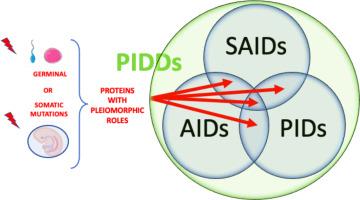Systemic auto-inflammatory diseases, auto-immune diseases and immune deficiencies: From independent to overlapped diseases approach
IF 8.3
1区 医学
Q1 IMMUNOLOGY
引用次数: 0
Abstract
Systemic AutoInflammatory Diseases (SAIDs), AutoImmune Diseases (AIDs), and Primary Immune Deficiencies (PIDs) were formely considered independent, even opposing, conditions. SAIDs were associated with the innate immune system, involving dysregulation of inflammation and recurrent episodes of systemic inflammation without an infectious process. Their original definition did not involve autoreactive cells or autoantibodies. In contrast, PIDs were characterised by defects in the adaptive or innate immune system, leading to recurrent infections and immune dysfunction. AIDs were inflammatory diseases also characterised by dysregulation of the immune system attacking its own tissues through autoreactive cells or autoantibodies. Nevertheless, advancements in genetics and a deeper understanding of T-cell development and signalling, immune tolerance, the complement pathway and inflammation have revealed that these conditions are overlapping diseases with shared immune system dysfunctions. These diseases now represent a continuum within a broader spectrum of disorders known as “Inborn Errors of Immunity”. However, this term is not suitable as it does not fully encompass cases arising from somatic mutations and can be stigmatising for patients. Therefore, we propose the terms “Primary Immune Deficiencies and Dysregulations” (PIDDs) or simply “Primary Immune Disorders” (PIDs) as more appropriate alternatives.
Thus, this article aims to describe known diseases where autoimmunity, autoinflammation and primary immunodeficiencies overlap, along with some mechanisms that may explain these interconnections. To our knowledge, no comprehensive reviews on this topic currently exist, despite its significance in modifying our understanding of these diseases, their treatment, and associated research.

全身性自身炎性疾病、自身免疫性疾病和免疫缺陷:从独立疾病到重叠疾病的途径。
系统性自身炎症性疾病(said)、自身免疫性疾病(AIDs)和原发性免疫缺陷(pid)以前被认为是独立的,甚至是对立的。甾体抗炎药与先天免疫系统有关,包括炎症失调和无感染过程的全身炎症反复发作。他们最初的定义不包括自身反应性细胞或自身抗体。相比之下,pid的特征是适应性或先天免疫系统的缺陷,导致复发性感染和免疫功能障碍。艾滋病是炎症性疾病,其特征是免疫系统失调,通过自身反应性细胞或自身抗体攻击自身组织。然而,遗传学的进步和对t细胞发育和信号传导、免疫耐受、补体途径和炎症的更深入理解表明,这些疾病是具有共同免疫系统功能障碍的重叠疾病。这些疾病现在代表了被称为“先天性免疫错误”的更广泛的疾病范围内的一个连续体。然而,这个术语并不合适,因为它不完全包括由体细胞突变引起的病例,并且可能给患者带来耻辱。因此,我们建议“原发性免疫缺陷和失调”(PIDDs)或简单地“原发性免疫疾病”(pid)作为更合适的替代术语。因此,本文旨在描述自身免疫、自身炎症和原发性免疫缺陷重叠的已知疾病,以及可能解释这些相互联系的一些机制。据我们所知,目前还没有关于这一主题的全面综述,尽管它在改变我们对这些疾病、其治疗和相关研究的理解方面具有重要意义。
本文章由计算机程序翻译,如有差异,请以英文原文为准。
求助全文
约1分钟内获得全文
求助全文
来源期刊

Autoimmunity reviews
医学-免疫学
CiteScore
24.70
自引率
4.40%
发文量
164
审稿时长
21 days
期刊介绍:
Autoimmunity Reviews is a publication that features up-to-date, structured reviews on various topics in the field of autoimmunity. These reviews are written by renowned experts and include demonstrative illustrations and tables. Each article will have a clear "take-home" message for readers.
The selection of articles is primarily done by the Editors-in-Chief, based on recommendations from the international Editorial Board. The topics covered in the articles span all areas of autoimmunology, aiming to bridge the gap between basic and clinical sciences.
In terms of content, the contributions in basic sciences delve into the pathophysiology and mechanisms of autoimmune disorders, as well as genomics and proteomics. On the other hand, clinical contributions focus on diseases related to autoimmunity, novel therapies, and clinical associations.
Autoimmunity Reviews is internationally recognized, and its articles are indexed and abstracted in prestigious databases such as PubMed/Medline, Science Citation Index Expanded, Biosciences Information Services, and Chemical Abstracts.
 求助内容:
求助内容: 应助结果提醒方式:
应助结果提醒方式:


